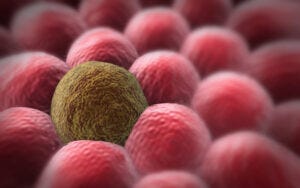September 6, 2023

Shanghai CARsgen will collaborate with Moderna to test a combination of their clinical stage Claudin18.2 cancer therapies in solid tumor cancers.
The pairing will combine CARsgen’s CT041, an autologous Claudin18.2 CAR T-cell candidate, with Moderna’s investigational mRNA Claudin18.2 cancer vaccine. The two companies will first conduct preclinical tests and then move on to a Phase I trial.
CT041 (satricabtagene autoleucel), is an autologous CAR T-cell candidate that CARsgen is developing for gastric, pancreatic and other digestive system cancers in multiple ongoing clinical studies in China and North America.

DepositPhotos/Ugreen
CARsgen believes CT041 has the potential to be a first-in-class drug globally. The company aims the drug at Claudin18.2 positive solid tumors, primarily gastric cancer/gastroesophageal junction cancer (GC/GEJ) and pancreatic cancer (PC). The company lists five trials of the candidate as a single therapy currently underway:
Investigator-initiated trials,
A Phase Ib clinical trial for advanced GC/GEJ and PC and a confirmatory Phase II clinical trial for advanced GC/GEJ in China,
A Phase I clinical trial for PC adjuvant therapy in China, and
A Phase 1b/2 clinical trial for advanced gastric or pancreatic adenocarcinoma in North America.
“CT041 is the most advanced solid tumor CAR-T in development (pivotal Phase II) and continues to show promise in treating gastric and pancreatic cancers. In our quest to make cancer curable, we are continuously exploring multiple modalities to eradicate tumors. Attacking tumors with CAR T-cell therapy in combination with a cancer vaccine could potentially provide greater clinical benefit to patients,” said Zonghai Li, CEO of CARsgen Therapeutics.
“We are pleased to partner with CARsgen to explore the potential synergy of CAR-T with an investigational mRNA cancer vaccine that encodes for the Claudin18.2 protein. Claudin18.2 is a promising therapeutic target to potentially treat multiple cancer types with high unmet medical need. We continue to deliver on the promise of mRNA science to create a new generation of transformative medicines in oncology,” said Lin Guey, CSO of External Research Ventures, Moderna.
Moderna, flush with the profits from its RNA COVID vaccine, wants to expand its pipeline and is looking for collaborations based on its mRNA expertise.
Previously, Moderna teamed up with Merck to develop a mRNA skin cancer vaccine that is being tested with Merck’s PD-1 drug, Keytruda. In a Phase II trial among high-risk skin cancer patients, the combination reduced the chance of developing deadly metastases by 65% and recurrence of high-risk melanoma by 44% compared to Keytruda as a monotherapy.
Founded 10 years ago, Moderna moved from research stage to an enterprise with a diverse clinical portfolio of vaccines and therapeutics across seven modalities, a broad intellectual property portfolio and integrated manufacturing facilities. The company is developing therapeutics and vaccines for infectious diseases, immuno-oncology, rare diseases, cardiovascular diseases and auto-immune diseases.
CARsgen, meanwhile, has built an integrated cell therapy platform with in-house capabilities that span target discovery, antibody development, clinical trials, and commercial-scale manufacturing. CARsgen’s vision is to become a global biopharmaceutical leader that brings innovative and differentiated cell therapies to cancer patients worldwide, making cancer curable.
A version of this article was first published in ChinaBio Today on Aug 21, 2023
About the Author
You May Also Like







